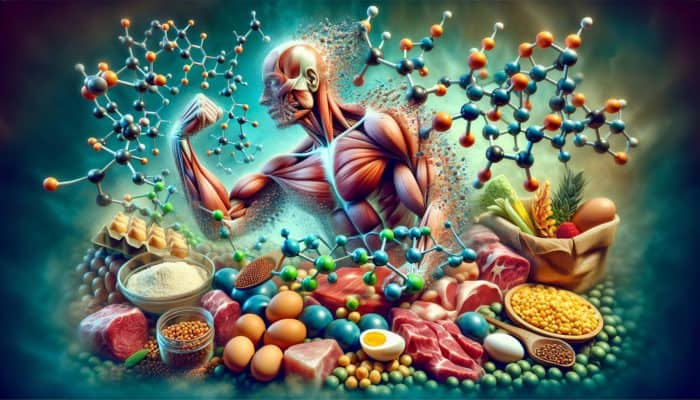Boost Your Athletic Performance with Strategic Protein Intake
Uncover the Benefits of Protein for Muscle Recovery and Repair in Athletes

Protein is a vital nutrient for athletes eager to enhance their recovery and facilitate muscle repair. This essential macronutrient is instrumental in repairing muscle tissues that sustain damage during rigorous training sessions, ultimately leading to improved recovery rates and muscle development. A lack of adequate protein can result in extended recovery periods, increased muscle soreness, and diminished performance levels. The benefits of incorporating sufficient protein into an athlete’s diet are significant, including:
- Effective muscle repair: Protein is crucial for forming new muscle tissue, which is essential for quick recovery.
- Minimised muscle soreness: Proper protein intake can significantly reduce the severity and duration of post-exercise discomfort.
- Enhanced muscle growth: Protein plays a pivotal role in supporting hypertrophy, critical for athletes aiming to boost strength and muscle size.
- Faster recovery: Consuming protein post-exercise accelerates recovery, enabling athletes to train more efficiently.
- Preservation of lean muscle mass: Protein helps prevent muscle loss, particularly during calorie deficits or intensive training periods.
- Improved immune function: Adequate protein intake reinforces the immune system, particularly vital for athletes facing intense physical stress.
Understanding the significance of protein in muscle repair empowers athletes to enhance their recovery approaches. The timing and amount of protein consumed can dramatically affect muscle recovery efficiency after strenuous activities. Athletes involved in high-intensity training or sports that induce considerable muscle damage must make protein intake a priority as a key component of their nutritional strategy.
What Is the Ideal Amount of Protein Required by Athletes for Peak Performance?
The protein needs of athletes vary widely and are highly individualised. Aspects such as the specific sport, training intensity, and body weight play crucial roles in determining personal protein requirements. For example, endurance athletes generally require around 1.2 to 1.4 grams of protein per kilogram of body weight, whereas strength athletes typically need between 1.6 to 2.2 grams per kilogram to effectively stimulate muscle growth and aid recovery.
Understanding these protein needs is vital for achieving optimal athletic performance. Athletes engaged in demanding training should assess their daily protein intake and adjust it as needed based on their training requirements. A well-planned diet that aligns with training intensity and goals can significantly improve athletic performance while minimising the risk of injuries.
How to Identify the Top Sources of Quality Protein for Athletes
Obtaining high-quality protein from a wide variety of sources is essential for athletes. Both animal and plant-based sources are available, each offering distinct nutritional advantages. Animal-derived options like lean meats, fish, dairy, and eggs provide complete proteins that encompass all essential amino acids necessary for muscle repair and growth.
In contrast, plant-based alternatives such as legumes, quinoa, tofu, and nuts also deliver valuable protein, though they may lack some essential amino acids. However, by combining various plant sources, athletes can obtain a complete amino acid profile.
Outstanding high-quality protein sources include:
- Chicken and turkey: These lean meats are fantastic protein sources, low in fat content.
- Fish: Varieties like salmon and tuna provide protein along with heart-healthy omega-3 fatty acids.
- Eggs: A versatile source of complete protein that can be prepared in many ways.
- Dairy products: Items like yogurt and cottage cheese offer excellent protein and calcium sources.
- Legumes: Beans and lentils provide a high-fibre, plant-based protein option.
- Nuts and seeds: Almonds and chia seeds deliver protein and beneficial fats that support heart health.
Incorporating a diverse range of these sources into daily meals can help athletes effectively meet their protein needs. It is crucial for athletes to explore both animal and plant-based proteins to create a well-rounded diet that bolsters their training and overall health.
How to Time Your Protein Intake for Maximum Recovery and Growth

The timing of protein consumption is a pivotal factor for maximising its benefits. Eating protein at strategic points throughout the day—especially after workouts—can significantly improve muscle recovery and growth. Research shows that the body is particularly responsive to protein intake within a window of roughly 30 minutes to two hours post-exercise, often referred to as the “anabolic window.”
Optimal timings for protein consumption include:
- Immediately post-workout: Consuming protein right after training enhances recovery and muscle repair.
- Pre-workout: Eating protein beforehand can provide amino acids during exercise.
- Before bed: A slow-digesting protein source can aid in muscle repair during the night.
- Evenly throughout the day: Spreading protein intake across meals boosts muscle synthesis.
By focusing on these optimal times for protein consumption, athletes can elevate their recovery and performance potential. Whether through whole foods or supplements, strategic protein timing is essential for anyone aiming to reach their athletic aspirations.
When and Why Should Athletes Consider Adding Protein Supplements to Their Diet?
Protein supplementation can be a beneficial resource for athletes who find it challenging to meet their protein needs through food sources alone. This consideration is particularly relevant for those with high training demands or dietary restrictions that limit protein intake. Supplements provide a practical and efficient means to increase protein consumption while supporting recovery and muscle growth.
Various forms of protein supplements are available, including whey, casein, and plant-based options, each with unique advantages. Whey protein, known for its quick absorption, is often favoured for post-workout recovery, while casein protein digests more slowly, making it advantageous for overnight recovery.
Benefits of protein supplementation include:
- Convenience: Easily fits into busy schedules, especially for athletes on the move.
- Targeted nutrition: Enables precise protein intake to align with specific dietary goals.
- Enhanced recovery: Aids in quicker recovery times post-exercise, allowing for more frequent training sessions.
- Variety: Offered in numerous flavours and formats, making it easier to find a suitable option.
For athletes, understanding when and why to leverage protein supplements can enhance performance and recovery. While whole foods should remain the foundation of nutrition, supplements can effectively fill dietary gaps when needed.
Insights from Experts on Daily Protein Utilisation by Athletes
Explore Real-World Examples of Effective Protein Utilisation

Real-world case studies offer valuable insights into how athletes successfully integrate protein into their daily routines. Take, for example, an elite marathon runner who emphasises protein in her post-workout recovery shake. She combines whey protein with a banana and spinach, ensuring her body receives essential nutrients after rigorous training sessions. By consuming protein soon after her workouts, she accelerates recovery and prepares her body for future training.
Another example features a professional rugby player who begins his day with a protein-rich breakfast. His morning meal includes eggs, avocado on whole-grain toast, and Greek yogurt, creating a balanced dish that supports his demanding training sessions. This combination provides not only protein but also essential fats and carbohydrates, all crucial for peak performance.
Practical strategies for athletes to optimise their protein intake include:
- Meal planning around training: Ensure that protein-rich foods are on hand for post-workout recovery.
- Use snacks wisely: Incorporate high-protein snacks like nuts or protein bars to meet daily intake goals.
- Experiment with supplements: Try different protein powders to discover the best fit for personal preferences and performance needs.
- Track protein intake: Utilise apps or journals to monitor protein consumption and make necessary adjustments.
These examples illustrate the various methods athletes can effectively prioritise protein in their diets. By customising their protein sources and timing to their individual needs and routines, athletes can significantly enhance their performance and overall health.
What Are the Best Times to Consume Protein for Optimal Results?
Strategically timing protein intake can greatly amplify its effectiveness. Athletes should focus on specific times throughout the day to maximise the benefits of protein consumption. Notably, the post-workout period is crucial for muscle recovery and growth. However, there are additional key windows when protein should be consumed to support overall performance.
Optimal times for protein consumption include:
- Immediately post-workout: To kickstart muscle recovery and replenish crucial amino acids.
- Breakfast: Starting the day with protein aids in muscle maintenance and energy levels.
- Before bedtime: Consuming a slow-digesting protein before sleep supports overnight recovery.
- Pre-exercise: Eating protein prior to workouts can provide energy and prevent muscle breakdown.
By timing protein intake effectively, athletes can significantly enhance recovery and performance outcomes. This strategy ensures they remain at the peak of their abilities and maintain a competitive edge.
How Can Athletes Ensure They Are Consuming High-Quality Protein Sources?
Ensuring access to high-quality protein sources is essential for athletes looking to meet their nutritional needs efficiently and safely. High-quality protein sources contain all essential amino acids, vital for optimal muscle repair and growth. Athletes should focus on integrating a mix of complete proteins from animal sources and complementary proteins from plant-based options.
When selecting protein sources, athletes should consider the following critical factors:
- Amino acid profile: Opt for sources that provide all essential amino acids.
- Digestibility: Choose proteins that are easily digestible to maximise absorption.
- Nutritional density: Focus on sources that offer additional nutrients, such as vitamins and minerals.
- Source certification: Look for products certified for quality and purity, especially supplements.
By concentrating on these factors, athletes can ensure they select high-quality protein options. This focus not only supports their performance goals but also contributes to overall health and wellness.
The Significant Impact of Protein on Enhancing Athletic Performance
Comprehending How Protein Elevates Athletic Performance
Protein is integral to enhancing athletic performance. It contributes to improved muscle function, endurance, and overall physical capabilities. By aiding muscle repair and growth, protein helps athletes recover from strenuous training sessions and prepares their bodies for future performances.
Research suggests that sufficient protein intake can lead to increased muscle mass and strength, directly linked to improved performance in various sports. Furthermore, protein impacts numerous bodily functions, including hormone production and immune response, both critical for sustaining peak athletic performance.
Key mechanisms through which protein enhances performance include:
- Muscle repair: Facilitates the rebuilding of muscle tissue after demanding exercise.
- Muscle growth: Supports hypertrophy, essential for enhancing strength and power.
- Energy provision: Can serve as an energy source during prolonged exercise or calorie deficits.
- Recovery enhancement: Reduces recovery time between workouts, allowing for more frequent training sessions.
Understanding the relationship between protein and performance is crucial for athletes aiming to refine their training regimens. By ensuring they consume adequate protein, athletes can enhance their physical capabilities and achieve superior overall performance outcomes.
What Is the Role of Protein in Endurance Sports Performance?
Endurance athletes have specific protein requirements that differ from those of strength athletes. While both groups need adequate protein to assist in muscle recovery and growth, endurance athletes focus more on sustained energy and recovery. Research indicates that endurance athletes may benefit from slightly lower protein intakes, typically around 1.2 to 1.4 grams per kilogram of body weight.
For endurance athletes, protein consumption helps maintain lean muscle mass during extended activities. Moreover, it aids recovery, especially following intense training sessions or long competitions. Consuming protein alongside carbohydrates post-exercise can enhance glycogen replenishment, which is vital for endurance performance.
Essential considerations for endurance athletes concerning protein intake include:
- Prioritise recovery: Focus on protein intake immediately after long training sessions to support recovery.
- Combine with carbohydrates: Pairing protein with carbohydrates optimises glycogen replenishment.
- Explore protein sources: Experiment with different protein sources to find the best options for digestion during training.
- Stay hydrated: Proper hydration is essential for protein metabolism and recovery.
By understanding their specific protein needs, endurance athletes can tailor their diets to boost performance and recovery. This focus on protein will help them maintain energy levels and enhance overall endurance.
What Are the Protein Needs for Strength and Power Athletes?
Strength and power athletes require higher protein intake to facilitate muscle growth and repair. For these athletes, protein is not just a supplement; it is a critical nutrient that directly influences their performance outcomes. Recommended protein intake for strength athletes generally ranges from 1.6 to 2.2 grams per kilogram of body weight.
Increased protein consumption encourages muscle hypertrophy, which is vital for developing strength and power. Additionally, it aids in recovery, allowing athletes to engage in more frequent and intense training sessions without risking injury.
Key considerations for protein intake among strength and power athletes include:
- Prioritise lean sources: Focus on high-quality protein sources that are low in fat.
- Utilise supplements wisely: Consider protein powders for convenience and post-workout recovery.
- Monitor intake: Keep track of protein consumption to ensure it aligns with personal training demands.
- Incorporate variety: Use a mix of food sources to guarantee a comprehensive amino acid profile.
By prioritising protein intake, strength and power athletes can enhance their training and achieve exceptional results. This strategy enables them to optimise muscle growth, shorten recovery times, and maintain their competitive edge in their respective sports.
Research-Based Insights on Protein Utilisation by Athletes
Explore Expert Analysis on Protein Research Findings
Scientific research consistently underscores the significance of protein in athletic diets. Numerous studies have shown that increased protein intake correlates with improved muscle repair, enhanced recovery, and superior performance outcomes for athletes across various sports. Meta-analyses have established a robust link between protein consumption and muscle synthesis, highlighting the advantages of sufficient protein intake in sports nutrition.
Research methodologies often employ controlled studies to investigate the effects of protein on muscle recovery and performance. For instance, studies may compare groups of athletes consuming varying levels of protein, assessing changes in muscle mass, strength, and recovery times. These findings consistently emphasise the importance of prioritising protein in athletes’ diets to achieve optimal results.
Key insights from protein research include:
- Increased muscle protein synthesis: Higher protein intake directly correlates with improved muscle recovery.
- Enhanced performance metrics: Athletes consuming adequate protein typically demonstrate superior performance outcomes.
- Reduced injury risk: Sufficient protein intake may lower the likelihood of injuries associated with overtraining.
- Accelerated recovery: Protein consumption post-exercise significantly reduces recovery times.
This evidence reinforces the critical role of protein in athletic performance. As athletes strive to optimise their training and enhance recovery, aligning their protein intake with scientific insights will yield better results.
What Are the Long-Term Benefits of Consistent Protein Intake for Athletes?
Regular protein consumption provides numerous advantages for athletes over time. Sustained protein intake supports ongoing muscle health, lowers injury risk, and enhances overall athletic longevity. Over an extended period, a strategic focus on protein can result in improved performance and greater resilience against the physical demands of training.
Research indicates that athletes who maintain a high-protein diet can achieve improved body composition, characterised by increased lean muscle mass and reduced body fat percentages. This balance is crucial for optimising performance across various sports, allowing athletes to compete at higher levels with less fatigue.
Key long-term benefits of protein consumption include:
- Continuous muscle health: Ongoing protein intake supports muscle repair and growth over time.
- Decreased injury risk: Adequate protein may lower the chances of injuries stemming from muscle strain.
- Enhanced metabolic function: Protein consumption can boost metabolic rates, assisting in body composition management.
- Faster recovery times: Consistent protein intake can enable quicker recovery between training sessions.
By recognising the long-term advantages of protein, athletes can make informed dietary choices that further their athletic careers. This understanding empowers them to sustain their health and improve their performance over time.
How Does Protein Affect Recovery Time Following Workouts?
Protein intake plays a significant role in reducing recovery time between workouts. After exercise, the body’s muscles engage in repair processes that require an adequate supply of amino acids for rebuilding. Consuming protein shortly after exercise can expedite these processes, allowing athletes to recover more swiftly and return to training sooner.
Research has shown that athletes who consume protein post-workout experience less muscle soreness and inflammation, leading to shorter recovery periods. This not only facilitates more effective training sessions but also helps prevent overtraining, which can lead to extended fatigue and injury.
Key ways in which protein influences recovery time include:
- Improved muscle repair: Protein intake supplies the necessary building blocks for muscle recovery.
- Reduced soreness: Athletes report lower muscle soreness when post-workout protein is consumed.
- Enhanced glycogen replenishment: Combining protein with carbohydrates aids in restoring energy levels.
- Facilitated adaptation: Adequate protein supports the body’s response to increased training loads.
By prioritising protein intake, athletes can effectively optimise their recovery strategies. This focus ensures they can train consistently and perform at their highest level in competitive scenarios.
Strategies for Successful Protein Supplementation
When Should Athletes Think About Incorporating Protein Supplements?
Athletes may consider protein supplements when their dietary intake doesn’t meet their needs. This situation can arise for various reasons, such as high training demands, dietary restrictions, or hectic lifestyles that hinder the ability to consume adequate whole food protein sources. Supplements offer a convenient way to boost protein intake, ensuring athletes meet their nutritional requirements.
For example, an athlete who struggles to meet their protein needs through diet alone might choose protein shakes or bars to fill the gap. Additionally, during periods of intense training or competition, supplements can provide a practical solution for quick nourishment.
Key scenarios for protein supplementation include:
- High training loads: When athletes engage in intense training, their protein requirements increase.
- Dietary restrictions: Vegans or vegetarians may find it difficult to meet protein needs through diet alone.
- Busy lifestyles: Supplements can conveniently deliver protein on the go.
- Specific performance goals: Athletes aiming for muscle gain may require additional protein support.
By recognising when to use protein supplements, athletes can ensure they fulfil their nutritional needs. This strategic approach to supplementation can enhance both performance and recovery outcomes.
What Types of Protein Supplements Are Available for Athletes?
A diverse array of protein supplements exists, each with unique characteristics and applications. The most common types include whey protein, casein protein, and plant-based protein powders. Understanding the differences among these options can assist athletes in selecting the most appropriate supplement for their needs.
Whey protein, derived from milk, is sought after for its rapid absorption rate, making it ideal for post-workout recovery. Casein protein, also sourced from milk, digests slowly, providing a sustained release of amino acids, which is beneficial for overnight recovery. Conversely, plant-based protein powders, such as pea, rice, and hemp protein, cater to those with dietary restrictions or preferences.
Key categories of protein supplements include:
- Whey protein: Quickly absorbed, excellent for post-exercise recovery.
- Casein protein: Slow-digesting, perfect for nighttime muscle repair.
- Plant-based protein: Ideal for vegans, offering diverse amino acid profiles.
- Egg protein: A complete protein source suitable for various diets.
By understanding the different types of protein supplements, athletes can make informed choices that align with their dietary preferences and performance objectives. This knowledge enhances their ability to effectively meet protein requirements.
How to Choose the Right Protein Supplement?
Selecting the right protein supplement involves several critical considerations. Athletes should assess factors such as digestibility, amino acid profile, and individual dietary preferences when choosing a protein product. Those with lactose intolerance might prefer plant-based options or whey protein isolate, which contains less lactose.
Furthermore, athletes should seek supplements that are third-party tested for quality and purity. This guarantees that the product contains what it claims and is free from harmful contaminants.
Key factors to consider when selecting a protein supplement include:
- Digestibility: Assess how easily the body can absorb and utilise the protein source.
- Amino acid profile: Choose a supplement that provides a complete amino acid profile for optimal muscle recovery.
- Flavor and texture: Consider personal preferences to ensure consistent usage.
- Price and quality: Balance cost with quality, opting for reputable brands with transparent labelling.
By carefully considering these factors, athletes can select the right protein supplement to enhance their nutritional strategies. This choice ensures they achieve their fitness goals while maintaining overall health.
Evaluating the Benefits and Risks of Protein Supplementation
Protein supplements can significantly aid in muscle recovery and growth. However, athletes must remain aware of potential risks associated with excessive protein intake. While protein is essential for muscle health, overconsumption can lead to adverse effects, including kidney strain and nutrient imbalances.
Moderate supplementation is generally safe for most athletes, especially when used to complement a balanced diet. Nonetheless, it is crucial to monitor total protein intake from both food and supplements to prevent overconsumption.
Key benefits of protein supplementation include:
- Aids muscle recovery: Facilitates quicker recovery following workouts.
- Convenience: Provides an easy way to meet protein needs while on the go.
- Diverse options: Offers a variety of flavours and formats to suit personal preferences.
- Enhanced performance: Can lead to improved training outcomes when used effectively.
By being mindful of protein supplementation, athletes can reap the benefits while minimising potential risks. This approach enables them to leverage the advantages of protein safely and effectively.
Integrating Protein with Other Nutrients for Optimal Athletic Performance
Understanding the Collaborative Role of Protein and Carbohydrates
Protein and carbohydrates synergistically fuel workouts and enhance recovery. For athletes, balancing these macronutrients is crucial for achieving optimal performance. While protein aids muscle repair and growth, carbohydrates serve as the primary energy source during intense training and competition.
During exercise, muscles primarily rely on carbohydrates for energy. However, post-exercise, the combination of protein and carbohydrates is critical for maximising recovery. Consuming protein alongside carbohydrates can improve glycogen replenishment, enabling athletes to restore energy levels more effectively.
Key interactions between protein and carbohydrates include:
- Energy provision: Carbohydrates deliver energy for workouts, while protein supports recovery.
- Glycogen replenishment: Combining both nutrients post-exercise optimises glycogen stores.
- Muscle recovery: Protein aids in repairing muscle tissue after carbohydrate-fuelled workouts.
- Enhanced performance: A balanced intake of both nutrients sustains athletic performance.
By understanding how protein interacts with carbohydrates, athletes can develop superior nutrition strategies. This balance is essential for maximising energy levels and enhancing overall athletic performance.
The Essential Role of Fats in a Protein-Rich Diet
Fats are critical in a protein-rich diet, supporting hormone production and overall health. While protein is fundamental for muscle maintenance, fats provide essential fatty acids necessary for various bodily functions. Healthy fats promote hormone production, vital for muscle growth and recovery, while also aiding the absorption of fat-soluble vitamins.
Athletes should prioritise incorporating healthy fat sources into their diets, such as avocados, nuts, seeds, and olive oil. Balancing fat intake with protein ensures athletes receive comprehensive nutrition that supports both performance and recovery.
Key functions of fats in a protein-rich diet include:
- Hormone production: Healthy fats assist in synthesising hormones important for muscle growth.
- Energy source: Fats provide a concentrated energy source, particularly during low-intensity activities.
- Nutrient absorption: Fats facilitate the absorption of vitamins A, D, E, and K.
- Overall health: A balanced fat intake promotes heart health and cognitive function.
By recognising the importance of fats in a protein-rich diet, athletes can ensure holistic nutrition. This approach fosters optimal performance and overall health.
Strategies for Achieving a Well-Balanced Diet for Peak Athletic Performance
Athletes must balance protein intake with other nutrients to maintain overall health and enhance performance. A well-rounded diet comprising carbohydrates, fats, vitamins, and minerals is essential for supporting the diverse needs of athletes. Each nutrient plays a unique role in performance, recovery, and overall well-being.
Incorporating a variety of foods from all food groups guarantees that athletes receive the necessary nutrients for optimal function. This balance not only boosts performance but also helps prevent nutritional deficiencies that could hinder athletic capabilities.
Key strategies for maintaining a balanced diet include:
- Diverse food choices: Include a wide range of foods to meet nutrient requirements.
- Meal planning: Organise meals to ensure balanced macronutrient distribution throughout the day.
- Hydration: Maintain adequate hydration to support overall health and performance.
- Regular monitoring: Track dietary intake to maintain balance and adjust as necessary.
By focusing on a balanced diet, athletes can optimise their training and performance outcomes. This holistic approach enhances health, recovery, and overall athletic potential.
Common Questions About Protein and Athletic Performance
What is the recommended daily protein intake for athletes to optimise performance?
Athletes should typically consume between 1.2 to 2.2 grams of protein per kilogram of body weight, depending on their specific sport and training intensity.
Which protein sources are most effective for athletes?
High-quality protein sources encompass lean meats, fish, eggs, dairy products, legumes, and plant-based proteins like quinoa and tofu.
When is the best time to consume protein for maximum benefit?
The optimal time to consume protein is immediately after workouts, but it can also be beneficial before bedtime and throughout the day when spread across meals.
Can protein supplements assist in muscle recovery?
Yes, protein supplements can support muscle recovery, particularly when dietary intake is insufficient or for quick post-workout nutrition.
What potential risks are associated with excessive protein intake?
Excessive protein consumption may lead to health issues such as kidney strain, nutrient imbalances, and digestive discomfort.
Do endurance athletes require more protein than strength athletes?
Endurance athletes typically need less protein than strength athletes, focusing more on carbohydrates for energy while still requiring adequate protein for recovery.
How does protein influence athletic performance outcomes?
Protein enhances athletic performance by supporting muscle repair, growth, and recovery, resulting in improved overall physical capabilities.
What types of protein supplements are available for athletes?
Common types of protein supplements include whey, casein, plant-based options, egg protein, and various protein blends, each offering unique benefits.
How can athletes ensure they are obtaining high-quality protein?
Athletes should focus on high-quality protein sources that provide a complete amino acid profile and are easily digestible, ideally sourced from reputable brands.
Is it necessary for all athletes to take protein supplements?
No, protein supplements are not essential for all athletes; they should be used strategically to fill dietary gaps when whole food protein intake is insufficient.
Connect with us on Facebook!
The Article How Athletes Use Protein Daily: A Universal Guide appeared first on https://athleticsupplement.com
The Article Protein Daily Use by Athletes: A Comprehensive Guide Was Found On https://limitsofstrategy.com

